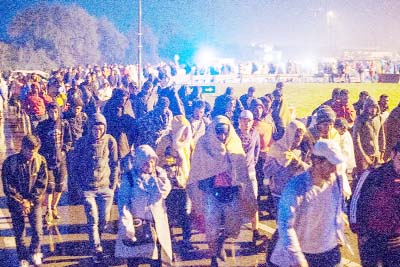
BBC Online :
Thousands of migrants have crossed into Austria, after Hungary’s surprise move to take them by bus to the border.
For days, the Hungarian government had blocked them from travelling by train to northern and western Europe.
Early on Saturday about 4,000 people crossed the Austrian border. They were received by the Red Cross and are now moving on towards Vienna and Germany.
Austria says the migrants, many of whom had initially fled Syria, can claim asylum there or carry on to Germany.
The move comes as European Union countries are struggling to agree on how to deal with an unprecedented surge of asylum seekers.
Hungary’s government eased restrictions on transit after many frustrated migrants overwhelmed police cordons and set off towards the border on foot on Friday. They crossed into Austria on foot – the Hungarian buses stopped before reaching the border and they had to walk the final stretch.
There were children and at least one man in a wheelchair.
They were exhausted. Some of them were limping, but many were smiling broadly – relieved to have finally left Hungary. “Where are we?” one man shouted. “Austria,” I replied. “Good,” he said.
Germany has said it expects to take in 800,000 people this year.
Austria’s Chancellor Werner Faymann said that after talks with his German counterpart Angela Merkel, the two countries would allow in the migrants due to the “emergency situation” in Hungary.
But he said he expected Hungary to respect any EU quotas for asylum seekers – something Hungary, along with the Czech Republic, Poland and Slovakia, has rejected.
Out of media player. Press enter to return or tab to continue.
Buses began picking up migrants from Keleti station in central Budapest, where thousands had been camped.
Vehicles were also sent to take those who had decided to walk along a motorway to Austria.
On Saturday Hungarian government spokesman Zoltan Kovacs told the BBC there would be no more buses or trains to take the migrants on to Austria.
He said the transport had been arranged as a one-off, because of fears for the migrants’ safety.
The station was virtually empty early on Saturday, but the BBC’s Ben Brown at the scene says the government’s move seems to have encouraged migrants who later streamed into the station.
A second group of some 1,000 migrants has now set off towards the border on foot. As the thousands crossed the border on foot, some Austrians displayed welcome signs.
Austrian Red Cross workers at a makeshift centre greeted the migrants with blankets and tea.
“I feel [at] home,” said Ayaz Morad, one of the first to arrive. “This is a great land – nice people, nice government.”
The migrants are now being taken to Vienna by bus and rail. Special trains to the capital are leaving the Austrian border town of Nickelsdorf every half hour.
Thousands of migrants have crossed into Austria, after Hungary’s surprise move to take them by bus to the border.
For days, the Hungarian government had blocked them from travelling by train to northern and western Europe.
Early on Saturday about 4,000 people crossed the Austrian border. They were received by the Red Cross and are now moving on towards Vienna and Germany.
Austria says the migrants, many of whom had initially fled Syria, can claim asylum there or carry on to Germany.
The move comes as European Union countries are struggling to agree on how to deal with an unprecedented surge of asylum seekers.
Hungary’s government eased restrictions on transit after many frustrated migrants overwhelmed police cordons and set off towards the border on foot on Friday. They crossed into Austria on foot – the Hungarian buses stopped before reaching the border and they had to walk the final stretch.
There were children and at least one man in a wheelchair.
They were exhausted. Some of them were limping, but many were smiling broadly – relieved to have finally left Hungary. “Where are we?” one man shouted. “Austria,” I replied. “Good,” he said.
Germany has said it expects to take in 800,000 people this year.
Austria’s Chancellor Werner Faymann said that after talks with his German counterpart Angela Merkel, the two countries would allow in the migrants due to the “emergency situation” in Hungary.
But he said he expected Hungary to respect any EU quotas for asylum seekers – something Hungary, along with the Czech Republic, Poland and Slovakia, has rejected.
Out of media player. Press enter to return or tab to continue.
Buses began picking up migrants from Keleti station in central Budapest, where thousands had been camped.
Vehicles were also sent to take those who had decided to walk along a motorway to Austria.
On Saturday Hungarian government spokesman Zoltan Kovacs told the BBC there would be no more buses or trains to take the migrants on to Austria.
He said the transport had been arranged as a one-off, because of fears for the migrants’ safety.
The station was virtually empty early on Saturday, but the BBC’s Ben Brown at the scene says the government’s move seems to have encouraged migrants who later streamed into the station.
A second group of some 1,000 migrants has now set off towards the border on foot. As the thousands crossed the border on foot, some Austrians displayed welcome signs.
Austrian Red Cross workers at a makeshift centre greeted the migrants with blankets and tea.
“I feel [at] home,” said Ayaz Morad, one of the first to arrive. “This is a great land – nice people, nice government.”
The migrants are now being taken to Vienna by bus and rail. Special trains to the capital are leaving the Austrian border town of Nickelsdorf every half hour.

